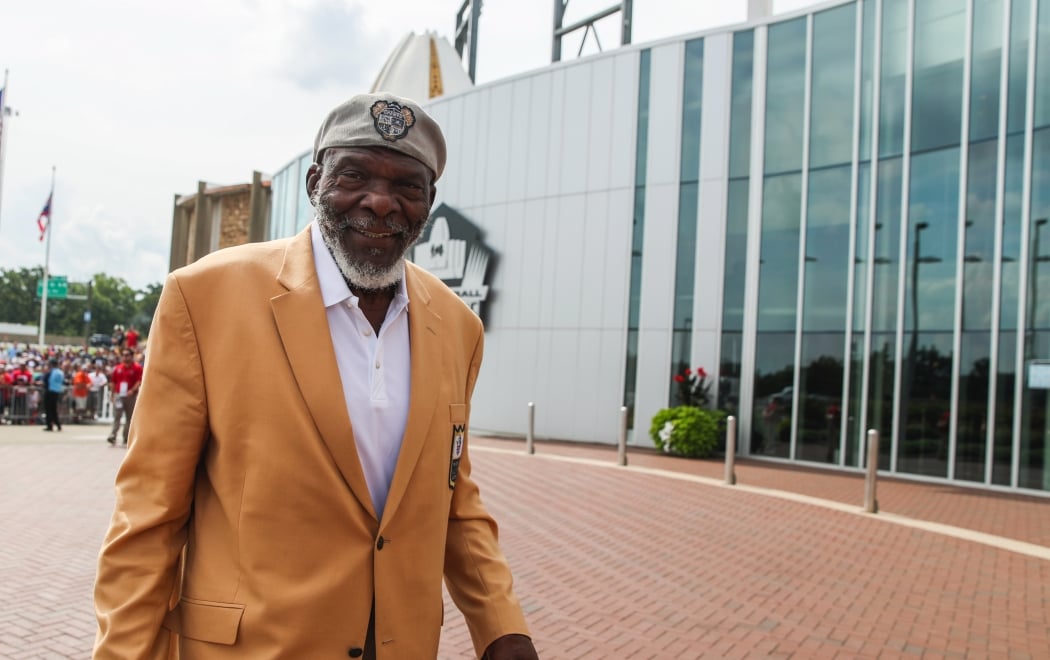Gold Jacket Spotlight: A Curtain Call for Carl Eller

Presenting his father for Enshrinement, Regis Eller couldn’t resist the opportunity to use Carl Eller’s undistinguished acting career as material for his own stand-up routine.
Carl, who takes center stage in the Gold Jacket Spotlight this week, was elected to the Pro Football Hall of Fame in 2004 not as an actor but as one of the premier defensive ends in the history of the National Football League. He played 225 games over 16 seasons – all but one with the Minnesota Vikings – and totaled 133.5 sacks.
He played in four Super Bowls, six Pro Bowls and collected All-Pro accolades five times.
Carl also worked to collect accolades on another stage, but he didn’t attain the same level of success, which Regis playfully shared with the audience in Canton.
“My dad taught me that it's OK to take risks, as evidenced by his acting career. … His filmography includes such films as “Busting,” “Taggart” and “The Black Six,” Regis noted. “You haven't seen them? Me neither.”
Regis said Carl tried out for “such films as ‘Throw Yo Momma From the Train.’ You know ‘Meet Joe Black?’ It was originally ‘Meet Black Joe’ starring Carl Eller. Of course, ‘The Black English Patient.’”
While Carl’s passion to find a second career didn’t result in Hollywood stardom, it did make him a leading man in his hometown of Minneapolis.
He founded substance abuse clinics in the Twin Cities area, making recovery and treatment for others his calling since 1986. He also worked for the Minnesota Department of Human Services, addressing issues of health disparities between the races, and founded the NFL Retired Players Association, an advocacy group dedicated to promoting the health and wellness of league retirees.
“My dad didn't always take himself seriously, thank God, but he definitely took his roles in life seriously,” Regis said in his presentation. “My dad operated a drug treatment center for many years. And I remember how important his clients and their sobriety were to him.”
Regis recounted a story of a client’s relapse and how it affected Carl.
“Dad took this as a personal failure, and it resonated through him. He wore his disappointment on his sleeve because it was impossible for him not to,” Regis said. “However, he would never give up, and he relentlessly attempted to get that client back into the program as if fighting for his own sobriety. These instances prove to me that my dad does not live his life for himself, but rather an entire community revels in his accomplishments, just as a whole community shares in his defeats. His work and care for people within his community is undoubtedly one of his life's works.”
Regis said any conversation in Minneapolis eventually would lead to a story “about how Carl Eller has helped them or someone they know and what it means to have Carl Eller as a part of their community.”
Carl said he took up acting as a quest for “for immortality – to be remembered.”
“I’m trying to make a place for Carl Eller in acting,” he said in an NFL Films production. “I want what I do now to live on as I live. That’s what I’m really after, immortality, something to live past my football days.”
That immortality didn’t come on the big screen, but rather in neighborhoods throughout Minneapolis and beyond. That post-football legacy along with Carl’s magnificent playing career get a curtain call this week in the Gold Jacket Spotlight.
Stories From The Hall of Fame Archives: Member of NFL's First Family of QBs Enters Hall
The Mannings – father Archie and sons Peyton and Eli – have set themselves apart when it comes to the family business of playing professional football.
Left-Handed QBs
Happy International Lefthanders Day! Here's a look at notable lefties who have played QB in the NFL.